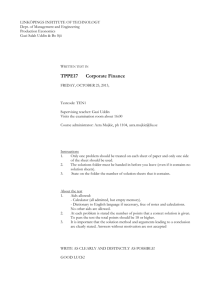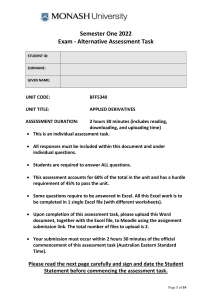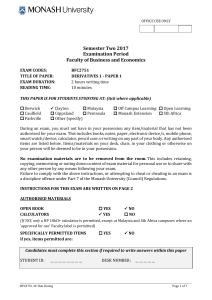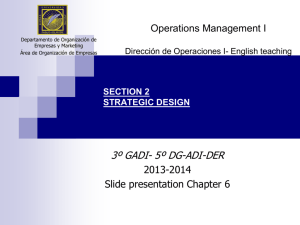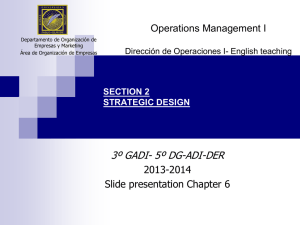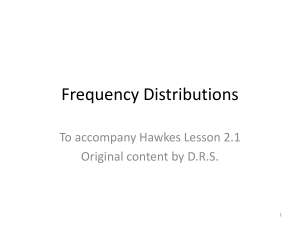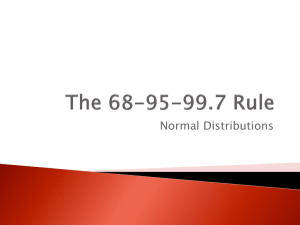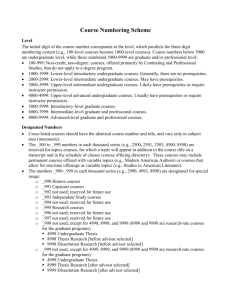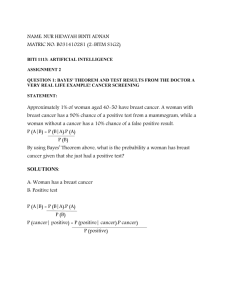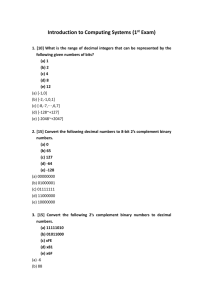TPPE17 Corporate Finance Exam 2014-08
advertisement
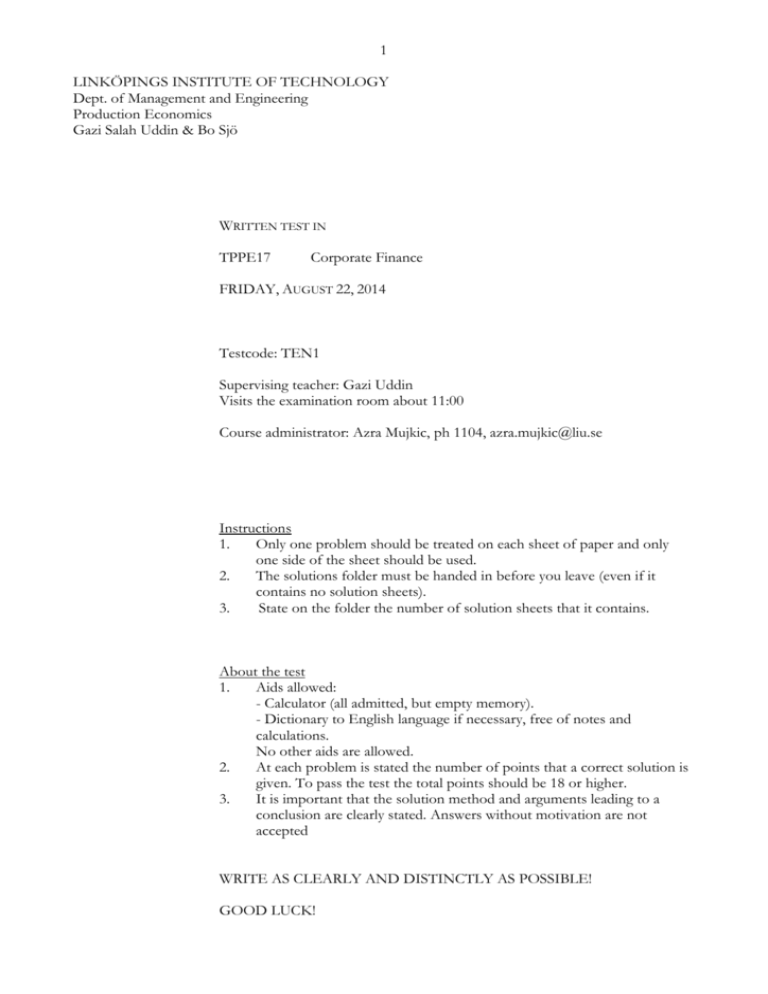
1 LINKÖPINGS INSTITUTE OF TECHNOLOGY Dept. of Management and Engineering Production Economics Gazi Salah Uddin & Bo Sjö WRITTEN TEST IN TPPE17 Corporate Finance FRIDAY, AUGUST 22, 2014 Testcode: TEN1 Supervising teacher: Gazi Uddin Visits the examination room about 11:00 Course administrator: Azra Mujkic, ph 1104, azra.mujkic@liu.se Instructions 1. Only one problem should be treated on each sheet of paper and only one side of the sheet should be used. 2. The solutions folder must be handed in before you leave (even if it contains no solution sheets). 3. State on the folder the number of solution sheets that it contains. About the test 1. Aids allowed: - Calculator (all admitted, but empty memory). - Dictionary to English language if necessary, free of notes and calculations. No other aids are allowed. 2. At each problem is stated the number of points that a correct solution is given. To pass the test the total points should be 18 or higher. 3. It is important that the solution method and arguments leading to a conclusion are clearly stated. Answers without motivation are not accepted WRITE AS CLEARLY AND DISTINCTLY AS POSSIBLE! GOOD LUCK! 2 Problem 1 (10 points) a) Explain the following concepts: i. Arbitrage (1 pts.) ii. The Law of One Price (1 pts.) b) Explain why maximizing the NPV is the correct decision rule in comparison to the IRR. (3pts.) c) The inherent conflict (dysfunctionality) of Corporate Governance in typical large public firm (2pts.) d) You have decided to purchase a house. The house costs $450,000. You have $100,000 in cash that you can use as a down payment on the house, but you need to borrow the rest of the purchase price. The bank is offering a 25-year mortgage that requires annual payments and has an interest rate of 7.5% per year. What will your annual payment be if you sign up for this mortgage? (3 pts.) Problem 2 (10 points) a) Explain the following concepts: i. Systematic and unsystematic risk (1pts.) ii. Sharp Ratio (1pts.) b) Write down the assumptions of the CAPM. Explain the efficient portfolio and the capital market line. (Draw necessary diagrams and equations to justify of your answer) (1+2=3pts.) c) Using the following information, estimate the Year 2010 2011 2012 Stock ABC -13% 15% 12% Stock XYZ -15% 22% 13% 2013 16% 18% i. the average return and volatility for each stock, ii. the covariance between the stocks, and iii. the correlation between these two stocks and interpret the result. (1+1+1+2=5 pts.) 3 Problem 3 (10 points) a) Explain the following concepts: i. Direct and Indirect Bankruptcy costs (2 pts.) b) What are the assumptions underlying the Modigliani-Miller theorem? Mathematically derive the MM1 Proposition in the presence of corporate taxes and show that value of the levered firm is equal to the value of the unlevered firm plus present value of the tax shield. (1+2=3pts.) c) The valuation model of a growing firm seems to validate the theory of dividend policy irrelevance. Explain this model and show how it ignores dividend policy. Prove that dividend policy is irrelevant at a discount rate of 12 percent, if a firm with two million shares decides to trade-off dividend between two periods by paying 20 percent less in the current period as against the policy of constant $50m in all periods. (3 pts.) d) Your firm is considering a $150 million investment to launch a new product line. The project is expected to generate a free cash flow of $20 million per year, and its unlevered cost of capital is 10%. To fund the investment, your firm will take on $100 million in permanent debt. Suppose the marginal corporate tax rate is 35%. Ignoring issuance costs, what is the NPV of the investment? (2 pts.) Problem 4 (10 points) a) Explain the following concepts: I. II. III. IV. American and European option (1pts.) Convertible security and convertible bond (1 pts.) Put-call parity (1pts.) Assumption of the Black-Scholes option pricing model. (2 pts.) b) Anders is interested in purchasing a European call on a hot new stock, Up, Inc. The call has a strike price of $100 and expires in 80 days. The current price of Up stock is $125, and the stock has a standard deviation of 35% per year. The risk-free interest rate is 6.25% per year. a. Using the Black-Scholes formula, compute the price of the call. b. Use put-call parity to compute the price of the put with the same strike and expiration date. (2.5+2.5=5pts.) Good Luck! TPPE17 Corporate Finance Exam 2014-08-22 4(5) THE CUMULATIVE NORMAL DISTRIBUTION Table gives N(x). To obtain N(-x) use N(-x) = 1-N(x). Use interpolation, e.g. N(0.6278) = N(0.62)+0.78*(N(0.63)-N(0.62))=0.7350 x 0,0 0,1 0,2 0,3 0,4 0,5 0,6 0,7 0,8 0,9 1,0 1,1 1,2 1,3 1,4 1,5 1,6 1,7 1,8 1,9 2,0 2,1 2,2 2,3 2,4 2,5 2,6 2,7 2,8 2,9 3,0 3,1 3,2 3,3 3,4 3,5 3,6 3,7 3,8 3,9 4,0 0 1 2 3 4 5 6 7 8 9 0,5000 0,5040 0,5080 0,5120 0,5160 0,5199 0,5239 0,5279 0,5319 0,5359 0,5398 0,5438 0,5478 0,5517 0,5557 0,5596 0,5636 0,5675 0,5714 0,5753 0,5793 0,5832 0,5871 0,5910 0,5948 0,5987 0,6026 0,6064 0,6103 0,6141 0,6179 0,6217 0,6255 0,6293 0,6331 0,6368 0,6406 0,6443 0,6480 0,6517 0,6554 0,6591 0,6628 0,6664 0,6700 0,6736 0,6772 0,6808 0,6844 0,6879 0,6915 0,6950 0,6985 0,7019 0,7054 0,7088 0,7123 0,7157 0,7190 0,7224 0,7257 0,7291 0,7324 0,7357 0,7389 0,7422 0,7454 0,7486 0,7517 0,7549 0,7580 0,7611 0,7642 0,7673 0,7704 0,7734 0,7764 0,7794 0,7823 0,7852 0,7881 0,7910 0,7939 0,7967 0,7995 0,8023 0,8051 0,8078 0,8106 0,8133 0,8159 0,8186 0,8212 0,8238 0,8264 0,8289 0,8315 0,8340 0,8365 0,8389 0,8413 0,8438 0,8461 0,8485 0,8508 0,8531 0,8554 0,8577 0,8599 0,8621 0,8643 0,8665 0,8686 0,8708 0,8729 0,8749 0,8770 0,8790 0,8810 0,8830 0,8849 0,8869 0,8888 0,8907 0,8925 0,8944 0,8962 0,8980 0,8997 0,9015 0,9032 0,9049 0,9066 0,9082 0,9099 0,9115 0,9131 0,9147 0,9162 0,9177 0,9192 0,9207 0,9222 0,9236 0,9251 0,9265 0,9279 0,9292 0,9306 0,9319 0,9332 0,9345 0,9357 0,9370 0,9382 0,9394 0,9406 0,9418 0,9429 0,9441 0,9452 0,9463 0,9474 0,9484 0,9495 0,9505 0,9515 0,9525 0,9535 0,9545 0,9554 0,9564 0,9573 0,9582 0,9591 0,9599 0,9608 0,9616 0,9625 0,9633 0,9641 0,9649 0,9656 0,9664 0,9671 0,9678 0,9686 0,9693 0,9699 0,9706 0,9713 0,9719 0,9726 0,9732 0,9738 0,9744 0,9750 0,9756 0,9761 0,9767 0,9772 0,9778 0,9783 0,9788 0,9793 0,9798 0,9803 0,9808 0,9812 0,9817 0,9821 0,9826 0,9830 0,9834 0,9838 0,9842 0,9846 0,9850 0,9854 0,9857 0,9861 0,9864 0,9868 0,9871 0,9875 0,9878 0,9881 0,9884 0,9887 0,9890 0,9893 0,9896 0,9898 0,9901 0,9904 0,9906 0,9909 0,9911 0,9913 0,9916 0,9918 0,9920 0,9922 0,9925 0,9927 0,9929 0,9931 0,9932 0,9934 0,9936 0,9938 0,9940 0,9941 0,9943 0,9945 0,9946 0,9948 0,9949 0,9951 0,9952 0,9953 0,9955 0,9956 0,9957 0,9959 0,9960 0,9961 0,9962 0,9963 0,9964 0,9965 0,9966 0,9967 0,9968 0,9969 0,9970 0,9971 0,9972 0,9973 0,9974 0,9974 0,9975 0,9976 0,9977 0,9977 0,9978 0,9979 0,9979 0,9980 0,9981 0,9981 0,9982 0,9982 0,9983 0,9984 0,9984 0,9985 0,9985 0,9986 0,9986 0,9987 0,9987 0,9987 0,9988 0,9988 0,9989 0,9989 0,9989 0,9990 0,9990 0,9990 0,9991 0,9991 0,9991 0,9992 0,9992 0,9992 0,9992 0,9993 0,9993 0,9993 0,9993 0,9994 0,9994 0,9994 0,9994 0,9994 0,9995 0,9995 0,9995 0,9995 0,9995 0,9995 0,9996 0,9996 0,9996 0,9996 0,9996 0,9996 0,9997 0,9997 0,9997 0,9997 0,9997 0,9997 0,9997 0,9997 0,9997 0,9997 0,9998 0,9998 0,9998 0,9998 0,9998 0,9998 0,9998 0,9998 0,9998 0,9998 0,9998 0,9998 0,9998 0,9999 0,9999 0,9999 0,9999 0,9999 0,9999 0,9999 0,9999 0,9999 0,9999 0,9999 0,9999 0,9999 0,9999 0,9999 0,9999 0,9999 0,9999 0,9999 0,9999 0,9999 0,9999 0,9999 0,9999 0,9999 0,9999 0,9999 0,9999 1,0000 1,0000 1,0000 1,0000 1,0000 1,0000 1,0000 1,0000 1,0000 1,0000 1,0000 1,0000 1,0000 1,0000 1,0000 1,0000 1,0000 1,0000 1,0000 1,0000
